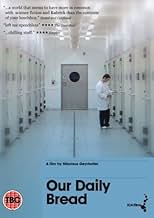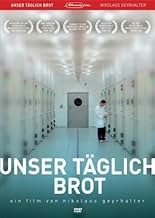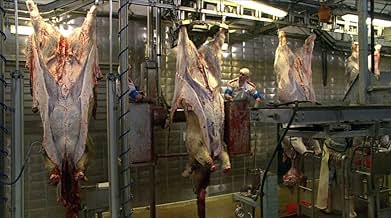IMDb-BEWERTUNG
7,5/10
2738
IHRE BEWERTUNG
Füge eine Handlung in deiner Sprache hinzuOUR DAILY BREAD is a wide-screen tableau of a feast which isn't always easy to digest - and in which we all take part. A pure, meticulous and high-end film experience that enables the audien... Alles lesenOUR DAILY BREAD is a wide-screen tableau of a feast which isn't always easy to digest - and in which we all take part. A pure, meticulous and high-end film experience that enables the audience to form their own ideas.OUR DAILY BREAD is a wide-screen tableau of a feast which isn't always easy to digest - and in which we all take part. A pure, meticulous and high-end film experience that enables the audience to form their own ideas.
- Regie
- Drehbuch
- Hauptbesetzung
- Auszeichnungen
- 4 Gewinne & 5 Nominierungen insgesamt
Empfohlene Bewertungen
Don't watch this movie if you have bad stomach or you won't be able to eat for a while. It shows quite a bit of shocking footage of modern food processing facilities. Dehumanization of food processing is well shown by creative camera placement. Camera placement resembles Kubrick's in some scenes - scenes of machines and people moving through corridors. Some of machines and procedures shown in the movie are really shocking. Movie doesn't have any narration, only sounds that you hear are sounds of the environment. A bit of well picked music would make this movie even better. If you want to know how the food you eat comes to your table this is the movie to watch.
if by artistic you mean concerned only with aesthetics, and beautiful camera work, and gorgeous film, and incredible color. i gotta take issue with saying that the documentary was cold and dispassionate and too concerned with art for art's sake. i would have to say not by the longest long shot. because....because the movie was equally as much about the people producing the food as it was about the production. and thats where much of the heart of the whole movie lies---you just don't notice it right away because there is no sound track, or you don't hear or understand the conversation between people. the isolation of the producers one from each other, for instance. the silence that they work in. those big ear muffs they wear. the deafening noise. the isolating self0-conscousness of being on camera, the movie maker implicating himself. (i definitely saw that a couple of times.) look at that first shot of the woman eating by herself with the mangled finger. an UNBELIEVABLY compassionate image. describing close to the entire world in thirty seconds. Or the next woman, taking her smoking break.
the voicelessness is about isolation. the workers, the animals, the act of filming. the "dumbness" of animals--their inability to speak--and that of the workers on many occasions--is what maybe the movie is all about. (and so the wordless narration is maybe an act of empathy with the animals?? I dunno for sure, but i could make a good argument i was going to write a paper.
and what about the shoeless guy in "The Dominator"?
AND... did notice how, when the ethnic workers are introduced, as opposed to the white northern working classes of Europe, when the immigrant populations are shown at work, the movie slightly changes?? The first and only shot of people at home, and talking in a group, and cooking at home (rice), are Africans. Refugees of wars, no doubt. For a long time in this film,m, I was wondering where the ethnic minorities who make up so much of Europes' working class had disappeared to. Suddenly, mid way, they show up. i don't think it's completely by accident. not completely. Then, later, the Arabic guys are shown taking there lunch break. they too, are eating and talking with each other. taking there break under a tree, close to the ground that they are harvesting from. these shots if anything rubbed me a little bit the wrong way, thinking a little bit of idealizing of the non-European "other" was going on. but the movie redeems itself on this front--or just proves me wrong--when we see a big table of white Europeans eating together. something is most definitely being said about tribalism, and about race, and consumption habits.
i could talk reams about how great this movie is--write a dissertation even like maybe Chris here--but that would totally ruin it. see the movie, its phenomenal. and disturbing..
the voicelessness is about isolation. the workers, the animals, the act of filming. the "dumbness" of animals--their inability to speak--and that of the workers on many occasions--is what maybe the movie is all about. (and so the wordless narration is maybe an act of empathy with the animals?? I dunno for sure, but i could make a good argument i was going to write a paper.
and what about the shoeless guy in "The Dominator"?
AND... did notice how, when the ethnic workers are introduced, as opposed to the white northern working classes of Europe, when the immigrant populations are shown at work, the movie slightly changes?? The first and only shot of people at home, and talking in a group, and cooking at home (rice), are Africans. Refugees of wars, no doubt. For a long time in this film,m, I was wondering where the ethnic minorities who make up so much of Europes' working class had disappeared to. Suddenly, mid way, they show up. i don't think it's completely by accident. not completely. Then, later, the Arabic guys are shown taking there lunch break. they too, are eating and talking with each other. taking there break under a tree, close to the ground that they are harvesting from. these shots if anything rubbed me a little bit the wrong way, thinking a little bit of idealizing of the non-European "other" was going on. but the movie redeems itself on this front--or just proves me wrong--when we see a big table of white Europeans eating together. something is most definitely being said about tribalism, and about race, and consumption habits.
i could talk reams about how great this movie is--write a dissertation even like maybe Chris here--but that would totally ruin it. see the movie, its phenomenal. and disturbing..
It is great. Not because of the subject or because I'm so interested in the food processing industry.(I'm really not) It is great because it ask and answer some really new things about documentary.
If not new,"different" in the best possible interpretation of the word. No talking, that means no interview or voice over. No editing tricks,just perfect efficient shots, one after the other. Forget the angry guy behind the camera or the microphone who really wants to not only show but persuade you. Forget the radio-documentary, here come the images-documentary. If you liked Depardon's documentary, if you like photography, if you are tired of Mickael Moore, if you don't think you need to be told what to think when you can just see it, there is a movie for you.
Its a lot more than a documentary about food industry as far as I'm concern, its about backing up and trying to get " a bigger picture"
MAc
If not new,"different" in the best possible interpretation of the word. No talking, that means no interview or voice over. No editing tricks,just perfect efficient shots, one after the other. Forget the angry guy behind the camera or the microphone who really wants to not only show but persuade you. Forget the radio-documentary, here come the images-documentary. If you liked Depardon's documentary, if you like photography, if you are tired of Mickael Moore, if you don't think you need to be told what to think when you can just see it, there is a movie for you.
Its a lot more than a documentary about food industry as far as I'm concern, its about backing up and trying to get " a bigger picture"
MAc
I'm always a sucker for films that try to emulate Baraka or Koyaanisqatsi. Non narrative films that let the images speak for themselves. A lot of films try and fail. Sometimes the images are too boring, sometimes it's too repetitive. 'Our Daily Bread' just about nearly gets it right by exploring how the food on our table comes to be. By going all over the world, and exploring all sorts of food, the filmmakers cover a spectacular realm of food, animals, and people for the documentary. Much is spectacular. What I found, and maybe I'm just a sicko, who knows, but I found the segments regarding how animals are processed to be the most fascinating. They almost completely copied the chick harvesting from Baraka (and who could blame them!) to the, I'm sorry, totally cool way they kill pigs nowadays. FUN FOR EVERYONE! Ha ha! I loved it!
This might be a film aliens exploring the human food system would produce. There is no dialogue, no explanations. Everything you see is repeated ten times. There is no particular order to what you see. There is no gross animal cruelty, just a clean, clinical, efficient Germanic lack of concern for animal welfare.
The silence and monotony gives a creepy feel about even things you might not normally consider sinister, like mining fertiliser. The sheer scale made me nauseous. The flow of pig, cow and chicken carcases goes on forever without pause. The hypnotic repetition creates a horrible inevitability.
Scenes that stick out: banks of chickens like inmates "heckling" two "guards" who walk down between the rows.
A cow that knows it is about to be killed and puts up a valiant attempt to escape.
A machine for vacuuming up chickens.
A Rube Goldberg contraption for gutting fish.
A man whose job is to mount fish on a sort of hobbyhorse to prepare them for further mechanised treatment. Hour after after he performs the same little grab and twist movement.
Men picking cabbages mounting in a frame that drives them at management's rate.
African immigrants without the money to buy the vegetables they grow in a greenhouse.
Casual calm castration, debeaking, slaughter and interfering with reproduction.
We humans have a sort of compact with domestic animals. We protect them from predators, we ensure they have food, we protect their health. In return they give us milk and meat. I think we are obligated to give them lives free from cruelty, reasonably close to life in the wild. But we have reneged. We care not a whit for their well being. Everything is for human convenience. We cheated. We ripped them off.
The silence and monotony gives a creepy feel about even things you might not normally consider sinister, like mining fertiliser. The sheer scale made me nauseous. The flow of pig, cow and chicken carcases goes on forever without pause. The hypnotic repetition creates a horrible inevitability.
Scenes that stick out: banks of chickens like inmates "heckling" two "guards" who walk down between the rows.
A cow that knows it is about to be killed and puts up a valiant attempt to escape.
A machine for vacuuming up chickens.
A Rube Goldberg contraption for gutting fish.
A man whose job is to mount fish on a sort of hobbyhorse to prepare them for further mechanised treatment. Hour after after he performs the same little grab and twist movement.
Men picking cabbages mounting in a frame that drives them at management's rate.
African immigrants without the money to buy the vegetables they grow in a greenhouse.
Casual calm castration, debeaking, slaughter and interfering with reproduction.
We humans have a sort of compact with domestic animals. We protect them from predators, we ensure they have food, we protect their health. In return they give us milk and meat. I think we are obligated to give them lives free from cruelty, reasonably close to life in the wild. But we have reneged. We care not a whit for their well being. Everything is for human convenience. We cheated. We ripped them off.
Wusstest du schon
- VerbindungenReferenced in Film Junk Podcast: Episode 232: Inglourious Basterds (2009)
Top-Auswahl
Melde dich zum Bewerten an und greife auf die Watchlist für personalisierte Empfehlungen zu.
Details
Box Office
- Weltweiter Bruttoertrag
- 71.810 $
- Laufzeit
- 1 Std. 32 Min.(92 min)
- Farbe
- Sound-Mix
- Seitenverhältnis
- 1.85 : 1
Zu dieser Seite beitragen
Bearbeitung vorschlagen oder fehlenden Inhalt hinzufügen




















